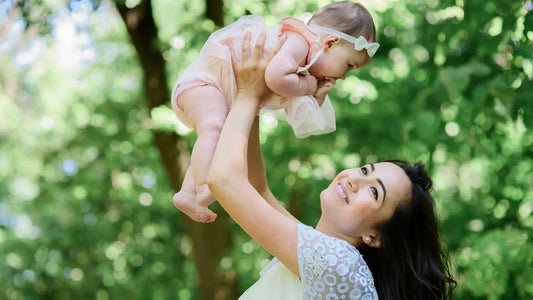7 tips to discipline a child without scolding or hitting
Every parent has moments when they find it hard to discipline their child. Controlling your temper can be challenging, whether you’re facing an angry toddler or an irritated teenager. The main fact is that physical aggression and yelling never help, and no parent wants to use their negative emotions on their child. But there’s a solution to everything, and hence to this problem too.
In this blog, let’s learn effective ways to discipline your child calmly.
Introduction
New or old, every parent has faced the challenge of disciplining their child, whether it's managing a tantrum, resolving a bad decision, or teaching responsibility. But here's the thing: discipline doesn’t have to involve harsh words or physical punishment. The best way to guide a child’s behavior is through methods that teach, not just control. There are far more effective and loving ways to discipline your child while nurturing the relationship with them.
Effective discipline isn’t about scolding or hitting your child. It’s about helping your child develop the emotional intelligence, self-regulation, and respect they need to navigate the world. And to your surprise, it is comparatively easier than using physical or verbal violence.
In this blog, we’ll share 7 powerful, positive strategies to discipline a child without scolding or hitting. Whether you’re a new parent or a first-time caregiver, these techniques will help you approach discipline with more confidence and compassion.
7 thoughtful and effective ways to discipline a child without scolding or hitting.
- Make clear rules and set expectations: It is important to understand that kids do fail to understand what is expected of them if not told clearly in easy instructions, so it is ideal to use simple language to tell them what they need to do, like instead of using “don’t make a mess,” you could use “please pick up the toys,” which would be clearer to the kid.
- Focus on positive behavior and ignore mistakes: Constantly scolding or pointing out their mistakes can lead the child to feel hopeless and upset. Rather than focusing on what they should not do, acknowledge and reward what they are doing correctly. Praise and promote positive behavior with kind words, hugs, or tiny rewards such as stickers.
- Use time-in and time-out depending on the situation: Parents often use time-outs as a punishment to discipline their children. While giving a time-out might be effective in many situations when the child is angry and needs time to process their emotions, giving a time-out is also not effective, as in some situations when the child needs family support or feels alone, giving a ‘time-in’ and spending family time with them might be beneficial to solve conflicts.
- Ask about preferences and avoid implications: Children often misbehave when they feel like their opinions or choices do not matter because they are small, so offering choices in small things can make a big impact and help them in decision-making skills. Give them room to express their emotions and decide for themselves.
- Model the behavior that you want to see: Living together and being the first person they have seen, kids learn everything, including habits, behavior, and even personality, from their parents. Whether it is good or bad, if kids see their parents do a certain thing, they try to do it as well. So it is important to show them how you handle emotions calmly and respectfully, even in difficult situations.
- Stay calm, listen, and use calm consequences: Before reacting, take a deep breath and ask them about their feelings. Instead of showing aggression and negative emotions, show them that you care and want to help them. Also, give your child a chance to do the right thing by explaining the consequences of their bad behavior. Instead of asking them to stop certain behaviors, tell them about the consequences it will lead to.
- Use distraction to direct positive behavior: When your child is being difficult, distracting them toward a more positive activity might result in the avoidance of negative behavior and difficult situations.
How do you behave with kids in difficult situations?
Parenting is not as simple as it looks. It is understandable to be stressed and irritated, but it is also important to acknowledge that kids are delicate, and how you act makes a big impact on their growth and overall personality.
Follow these tips to manage stress and be a better parent towards your child:
- Take a break: When children make things difficult, it is natural to feel irritated and aggressive from all the stress building up. In such situations, it is important to stop and take a break for yourself.
- Step back: Taking a step back to remind yourself about the initial phase might help manage stress. Doing things you like can be one of the steps; remind yourself that your kids are going to be whoever you are and take better care of yourself.
- Praise yourself: Take a moment to give yourself the credit of all you are Even after the stress and pressure that you have to deal with, the better you are to yourself, the better you will be to your kids.
Conclusion
In conclusion, disciplining a child without scolding or hitting is both possible and highly effective. By focusing on clear communication, positive encouragement, modeling good behavior, and using calm consequences, you can discipline your child while promoting emotional growth and nurturing your relationship. Discipline is about teaching, not punishing, and with patience and compassion, you can create a nurturing environment where your child learns from their actions.
Shop for the Best Baby Care Products
FAQs
Q1: How do you punish your child for bad behavior?
Ans. Parents should avoid verbal abuse or physical punishment and instead use calm speech and solutions to the problem.
Q2: How to repair after shouting at a child?
Ans. You should openly ask for forgiveness to show them how to express emotions and also spend some quality time with them to ease the situation.
Q3: What are the two basic goals of discipline?
Ans. Discipline helps your child to stay away from danger and also learn self-control.




